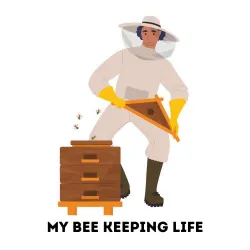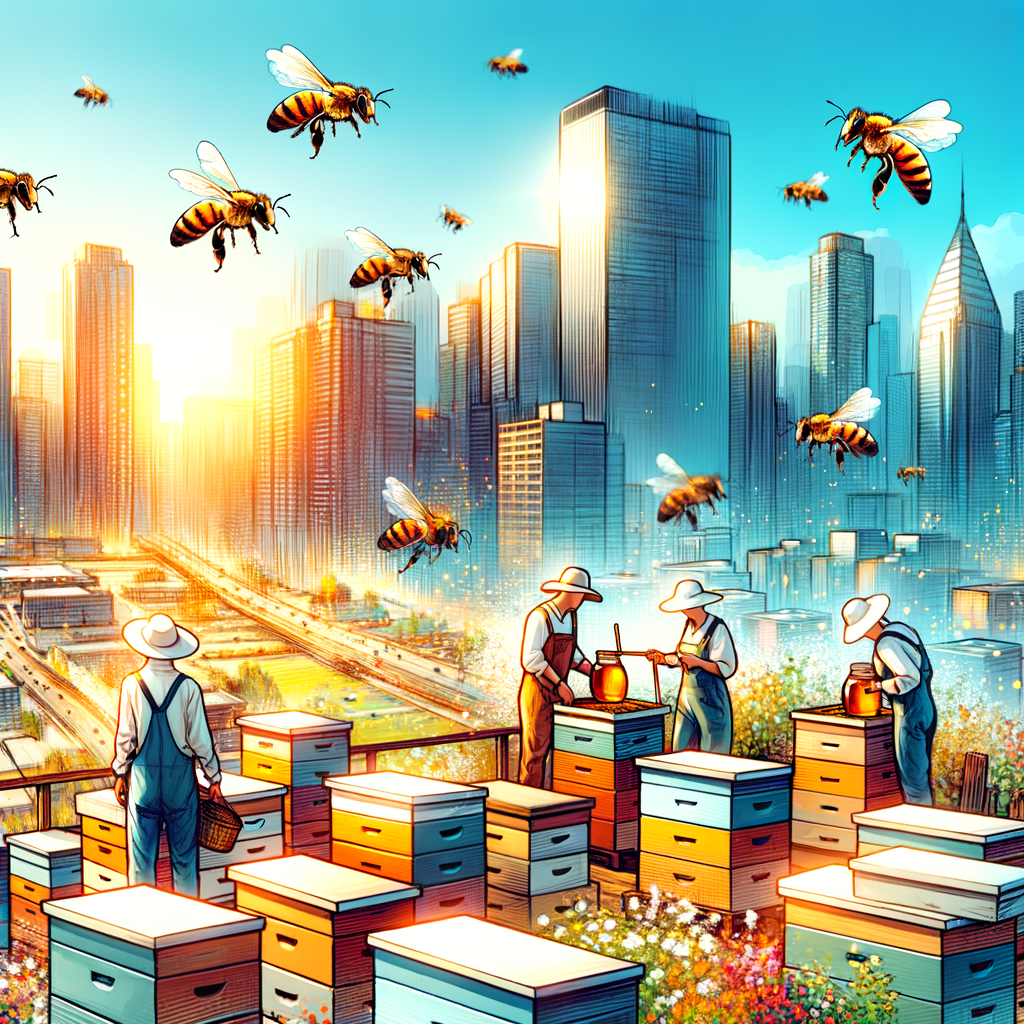
Introduction to Beekeeping Research
As we delve into the fascinating world of beekeeping, it’s crucial to understand its importance and the research that has been conducted in this field. This introductory section will provide a basic understanding of beekeeping and an overview of the research studies that have been carried out.
- Understanding the importance of beekeeping
- Overview of beekeeping research studies
Beekeeping, also known as apiculture, is not just about honey production. It plays a vital role in maintaining our ecosystem. Bees are known as ‘pollinators’, meaning they help plants reproduce. This process is crucial for the survival of many plant species and, by extension, the animals that rely on those plants for food and shelter. Without bees, our food system would look drastically different.
Beekeeping also has economic importance. It provides livelihoods to many people worldwide, from honey producers to wax and pollen suppliers. The value of honey bees as pollinators is estimated to be in the billions of dollars annually.
Research in beekeeping is a growing field, with studies focusing on various aspects such as bee health, honey production, and the impact of environmental changes on bees. For instance, research has shown that certain pesticides can harm bees, leading to changes in regulations and practices to protect these crucial insects.
Other studies have looked at how to increase honey production and the quality of honey. For example, research has found that the type of plants bees have access to can affect the taste and quality of the honey they produce.
Research is also being conducted on the impact of climate change on bees and how to help them adapt. This is crucial as changes in temperature and weather patterns can affect bees’ ability to pollinate and produce honey.
In the following sections, we will delve deeper into the current state of the beekeeping industry, specific research in apiculture, and case studies in beekeeping research. So, let’s continue our journey into the buzzing world of beekeeping research.
Current State of the Beekeeping Industry
The beekeeping industry is buzzing with activity. It’s an industry that’s been around for centuries, and it’s still going strong today. But what does the current state of the beekeeping industry look like? Let’s dive in and find out.
Opportunities in the Beekeeping Industry
Despite the challenges, there are many opportunities in the beekeeping industry. These opportunities are not only beneficial to those involved in the industry, but they also contribute to the overall economy and the environment.
- Increasing demand for honey and other bee products: The demand for honey and other bee products is on the rise. According to the National Honey Board, the per capita consumption of honey in the United States has increased by 60% over the past decade. This increase in demand presents a significant opportunity for beekeepers and honey producers. Not only is honey a sweet treat, but it’s also used in a variety of products, from skincare to cooking ingredients. This wide range of uses contributes to its increasing demand.
- Economic opportunities in beekeeping research: The beekeeping industry isn’t just about producing honey. There’s a lot of research that goes into understanding bees and how to keep them healthy. This research is vital because bees play a crucial role in our ecosystem. They help pollinate plants, which is essential for our food supply. As a result, there are economic opportunities in beekeeping research. Scientists, researchers, and even tech companies are investing in this area, creating jobs and contributing to economic growth.
In conclusion, the beekeeping industry is a vibrant and essential part of our economy and environment. Despite the challenges it faces, there are many opportunities for growth and development. Whether it’s through the increasing demand for honey and other bee products or the economic opportunities in beekeeping research, the industry is buzzing with potential.
Challenges in Beekeeping Industry
While beekeeping offers numerous opportunities, it also presents certain challenges that need to be addressed. Let’s delve into some of the key issues currently facing the beekeeping industry.
- Climate Change and its Impact on Beekeeping
- Dealing with Diseases and Pests
Climate change is a significant challenge for beekeepers worldwide. Changes in temperature and precipitation patterns can disrupt the natural lifecycle of bees. For instance, warmer winters can cause bees to emerge from their hives earlier than usual, leading to a mismatch between the availability of flowers and the bees’ need for nectar.
Moreover, extreme weather events such as droughts, floods, and heatwaves can destroy the bees’ habitat and food sources, leading to a decline in bee populations. According to a study, climate change could cause a decrease in the global honey bee population by up to 35%.
Another major challenge in the beekeeping industry is the prevalence of diseases and pests. These can significantly impact the health and productivity of bee colonies. Common diseases include American Foulbrood and Nosema, while pests such as the Varroa mite can wreak havoc on bee populations.
Managing these diseases and pests requires constant vigilance and the use of appropriate treatments. However, some treatments can have side effects and may not be effective against all types of diseases and pests. Therefore, research into more effective and sustainable methods of disease and pest control is crucial for the future of the beekeeping industry.
In conclusion, while the beekeeping industry faces significant challenges due to climate change and diseases, there are also opportunities for research and innovation to help overcome these obstacles. By understanding and addressing these challenges, we can ensure a sustainable future for the beekeeping industry.
Research in Apiculture
Apiculture, or beekeeping, is a field that is constantly evolving. Researchers and scientists are always looking for ways to improve the health and productivity of honeybee colonies. Let’s delve into some of the latest advancements in this field.
Advancements in Beekeeping Research
There are two main areas of focus in recent beekeeping research: technological advancements and new research findings. Both of these areas have made significant strides in improving the practice of beekeeping.
- Technological Advancements in Beekeeping
- Latest Beekeeping Research Findings
Technology has revolutionized many industries, and beekeeping is no exception. From remote hive monitoring systems to automated honey extractors, technology is making beekeeping more efficient and less labor-intensive. For instance, remote hive monitoring allows beekeepers to track the health and productivity of their hives in real-time, without disturbing the bees. Automated honey extractors, on the other hand, make the process of extracting honey faster and easier, allowing beekeepers to harvest more honey with less effort.
Research is the backbone of advancements in any field, and beekeeping is no different. Recent studies have shed light on various aspects of bee health, behavior, and productivity. For example, a study found that bees are more productive in urban environments than in rural ones, challenging the conventional wisdom that bees thrive best in the countryside. Another study discovered that certain plant extracts can help protect bees against harmful parasites, paving the way for more natural and sustainable beekeeping practices.
These advancements and findings are not just important for beekeepers, but for everyone. Bees play a crucial role in pollinating our crops and maintaining biodiversity. By improving our understanding and management of bees, we can help ensure the survival of these vital creatures and the ecosystems they support.
Future of Beekeeping Research
As we look to the horizon, the future of beekeeping research is buzzing with potential. Let’s explore the predicted trends in this field and some of the upcoming projects that are set to shape the world of apiculture.
- Predicted Trends in Beekeeping Research
With the increasing importance of bees in our ecosystem, research in beekeeping is set to take new directions. Here are a few trends we can expect:
- Technology Integration: With advancements in technology, we can expect more use of drones, artificial intelligence, and machine learning in beekeeping research. These technologies can help in monitoring bee health, predicting diseases, and improving honey production.
- Climate Change Studies: As the world grapples with climate change, its impact on bees and beekeeping will be a significant area of research. Studies will focus on how changing weather patterns affect bee behavior and honey production.
- Bee Genetics: Research will delve deeper into bee genetics to understand their behavior, resistance to diseases, and their role in the ecosystem better.
- Upcoming Beekeeping Research Projects
Several exciting research projects are on the horizon that will contribute to our understanding of bees and beekeeping. Here are a few to watch:
| Project | Description |
|---|---|
| Bee Health AI | This project aims to use artificial intelligence to monitor bee health and predict potential diseases. |
| Climate Impact on Bees | This research will study the impact of changing climate conditions on bee behavior and honey production. |
| Bee Genetic Mapping | This project will focus on understanding bee genetics to improve their resistance to diseases and increase honey production. |
In conclusion, the future of beekeeping research is promising and full of opportunities. As we continue to understand the importance of bees in our ecosystem, the focus on this field will only grow. So, let’s keep our eyes on these exciting developments and see where the research takes us!
Case Studies in Beekeeping Research
Let’s delve into some successful beekeeping research studies and understand their impact on the industry. These case studies will highlight the importance of research in the field of beekeeping.
- Successful Beekeeping Research Studies
One of the most successful research studies in beekeeping was conducted by the University of California, Davis. The researchers aimed to improve the health of honey bees by studying their behavior, genetics, and environmental factors. They discovered that bees are more productive in environments with diverse flora. This study has led to a shift in beekeeping practices, with beekeepers now focusing on providing diverse floral resources for their bees.
Another important study was carried out by the University of Sussex. They developed a new type of beehive, called the “Hive of the Future”, which is designed to reduce the stress levels of bees. This hive has been proven to increase honey production and improve the overall health of the bee colonies.
- Impact of Research on the Beekeeping Industry
Research in beekeeping has had a significant impact on the industry. It has led to the development of new techniques and technologies that have improved the health and productivity of bees. For example, the “Hive of the Future” developed by the University of Sussex has revolutionized the way beekeepers manage their hives, leading to increased honey production.
Research has also helped to combat the various challenges faced by the beekeeping industry, such as diseases and pests. Studies have led to the development of new treatments and preventive measures, ensuring the survival and prosperity of bee colonies.
Moreover, research has provided valuable insights into the behavior and needs of bees. This has enabled beekeepers to create more suitable environments for their bees, leading to healthier and more productive colonies.
In conclusion, research is vital for the advancement of the beekeeping industry. It not only improves the health and productivity of bees but also helps to overcome the various challenges faced by the industry. Therefore, it is important to continue supporting and conducting research in this field.
Conclusion: The Buzzing Opportunities in Beekeeping Research
As we wrap up our exploration into the world of beekeeping research, it’s clear that this field is buzzing with opportunities. The future of beekeeping research holds exciting prospects that could revolutionize the industry and contribute to global sustainability efforts. Let’s summarize the key takeaways and discuss how you can contribute to this vital research.
- Key takeaways on the future of beekeeping research:
- Advancements in technology are paving the way for more efficient and sustainable beekeeping practices.
- Research is increasingly focusing on the health and wellbeing of bees, recognizing their crucial role in our ecosystem.
- Studies are exploring innovative ways to combat the challenges faced by bees, such as diseases, pests, and climate change.
- There is a growing interest in urban beekeeping, with research exploring its potential benefits and challenges.
- How to contribute to beekeeping research:
- Become a citizen scientist: Many research projects rely on data collected by beekeepers. By monitoring your own hives and sharing your observations, you can contribute valuable data.
- Support beekeeping research: Consider donating to organizations that fund beekeeping research. Your financial support can help advance critical studies.
- Stay informed: Keep up-to-date with the latest research and share your knowledge with others. By spreading awareness, you can help promote the importance of beekeeping research.
The future of beekeeping research is promising and filled with opportunities. Here are some key points to remember:
Interested in contributing to beekeeping research? Here’s how you can get involved:
In conclusion, beekeeping research is a dynamic field with the potential to make significant contributions to our understanding of bees, their needs, and the challenges they face. By staying informed and getting involved, we can all play a part in supporting this important work.








